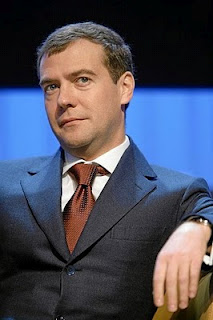-
Is the Melting Arctic a Security Challenge or Crisis? The View From Russia and Washington
March 24, 2010 By Geoffrey D. DabelkoIn his opening remarks at the Security Council of the Russian Federation’s meeting on climate change last week, Russian President Dmitry Medvedev framed climate change as a force for increased competition and “disputes between countries.” Unsurprisingly, he focused on the Arctic region and what he called the “inadmissible” and “unfair” threats to Russia’s access to the region’s resources:
We must not forget either that climate change can give rise not only to physical change, change in the nature around us, but can also see the emergence of disputes between countries over energy exploration and extraction, the use of marine transport routes, bioresources, and shortages of water and food resources. The countries bordering the Arctic region are already actively engaged in expanding their research, economic, and even military presence in the Arctic. Unfortunately, in this situation, we are seeing attempts to limit Russia’s access to exploring and developing Arctic energy deposits, which is inadmissible from a legal point of view and unfair in terms of our country’s geographical location and very history.
His reference to “shortages of water and food resources” fits squarely within the increasingly common view of climate change’s potential as a “conflict accelerant” (see, e.g., the U.S. Department of Defense’s 2010 Quadrennial Defense Review) or “threat multiplier” (as in CNA’s National Security and the Threat of Climate Change and statements from representatives of the UK and EU foreign offices).
But his Arctic comments sounded different than what I’ve been hearing in Washington. The Arctic rightfully gets a lot of attention for alarming rates of physical change, newly accessible resources, and potential new shipping routes. Yet remarks at a recent spate of Arctic climate and security discussions suggest officials in Washington view the geopolitical and trade issues more as “challenges” than “crises.”
For example, last month at the Stimson Center, and just yesterday at the Johns Hopkins University Applied Physics Lab, the U.S. Navy’s director of Task Force Climate Change and oceanographer, Rear Admiral David Titley, used “challenge” rather than “crisis” to depict the security situation in the far North. At numerous panels, officials and experts expressed confidence that the Arctic Council and related institutions are forums robust enough to manage current and future disputes.
Ironically, one of those key institutions is UNCLOS, the Law of the Sea treaty, which has been ratified by 157 countries, but not the United States. U.S. military and civilian officials alike see ratification as a key step for the United States to represent its interests in these critical multilateral settings. Nevertheless, we can anticipate some knee-jerk demagoguery about the treaty ceding U.S. sovereignty to the United Nations, so the Senate is unlikely to take up the issue until after the fall 2010 elections.
I want to thank friend and colleague Alexander Carius, co-director of Adelphi Research, for calling President Medvedev’s speech to my attention.
Photo: Russian President Dmitry Medvedev, courtesy Flick user World Economic Forum
 A Publication of the Stimson Center.
A Publication of the Stimson Center.




